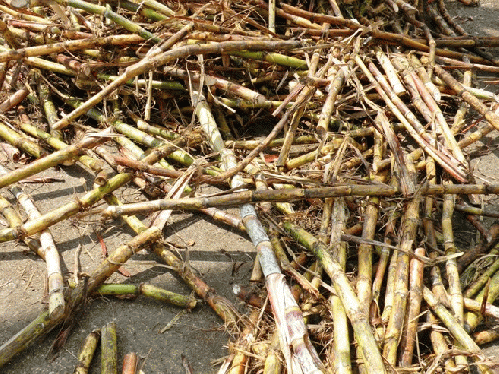The fortunes of sugarcane have always been pivotal to the history of Haiti, helping to shape its character and destiny. Is sugarcane about to write a new chapter in Haiti's history?
********
Click here for Part 1 of this series.
Click here for Part 2
Click here for Part 3
Click here for Part 4
Click here for Part 5
Click here for Part 6
Click here for Part 7
Click Here for Part 8
Click here for Part 9
Click here for Part 10
********
Haiti's modern history since colonial times is deeply intertwined with sugar, because the reason why France even colonized the island, pushing aside waning Spanish influence,was partly due to the abundant potential of sugarcane that the French were eventually able to massively harvest on their brutal slave plantations, which made Haiti the richest colony in the Western Hemisphere, but also made it ripe for the greatest slave rebellion in history, a long and bloody affair that ended in Haiti's independence in 1804. And after the revolution, Haiti continued to grow and export sugar, but they never regained the magnitude of harvests and financial returns that the French had enjoyed. Over time, the fortunes of this once jeweled agricultural industry continued to wane.
* by Photobucket Commons Artistic rendition of Haitian slaves rising up against their French masters
Then something happened in the 1990s that was all but a death blow to the sugar industry in Haiti. It was called NAFTA, the North American Free Trade Agreement, which neo-Liberal darling Bill Clinton signed into effect in 1993, savagely impacting farming in Mexico and Haiti, to name two victimized countries. Populist author and public figure Jim Hightower wrote about this back in 2001, to quote:
In both Mexico and Haiti, NAFTA policies have caused
an exodus from rural areas forcing people to live in urban slums and accept low
paid sweatshop labor. Farmers in Mexico,
unable to compete with the large-scale importation and chemical-intensive mass
production of U.S.
agricultural corporations, are swimming in a corn surplus that has swelled
approximately 450% since NAFTA's implementation. Haiti's
deregulation of trade with the U.S.
has destroyed the island's rice industry in a similar manner. Urban slums,
engorged with rural economic refugees, are contributing to the breakdown of
cultural traditions and public authority, making the growing masses
increasingly ungovernable. (source)
Also badly affected was the already struggling sugar industry. Pascal Fletcher of Reuters, reiterating what Hightower said, recently wrote back in March, 2010:
Experts now acknowledge that the influx over the past two decades of subsidized cheaper farm imports, ushered in by World Bank and International Monetary Fund free-trade policies that obliged Haiti to open its markets, delivered a virtual death blow to Haitian agriculture from which it has never recovered. (source)
Haiti has become devastatingly dependent, to the tune of some 80% of its annual revenues now, on food imports to feed its almost ten million people thanks to these policies, the food crisis having been exacerbated many-fold by the great Earthquake of January 12th. Now Haitians are not only dependent on imported food, but also, for the million plus earthquake refugees, donated imported food supplied by the disaster relief NGOs, who have their own problems and contradictions that limit their effectiveness. So imports and handouts are no solution at all, only symptoms of a dysfunctional economic/political system.
Everybody who really cares about the Haitian people realizes that Haiti must once again become a self-sustaining agricultural producer to stabilize, grow and prosper. Regine Simon-Barjon, a prominent member of the Haitian-American Chamber of Commerce, made this point in Fletcher's same article:
"We won independence 200 years ago but ... not really, because we're begging consistently,"........
(Note: You can view every article as one long page if you sign up as an Advocate Member, or higher).






